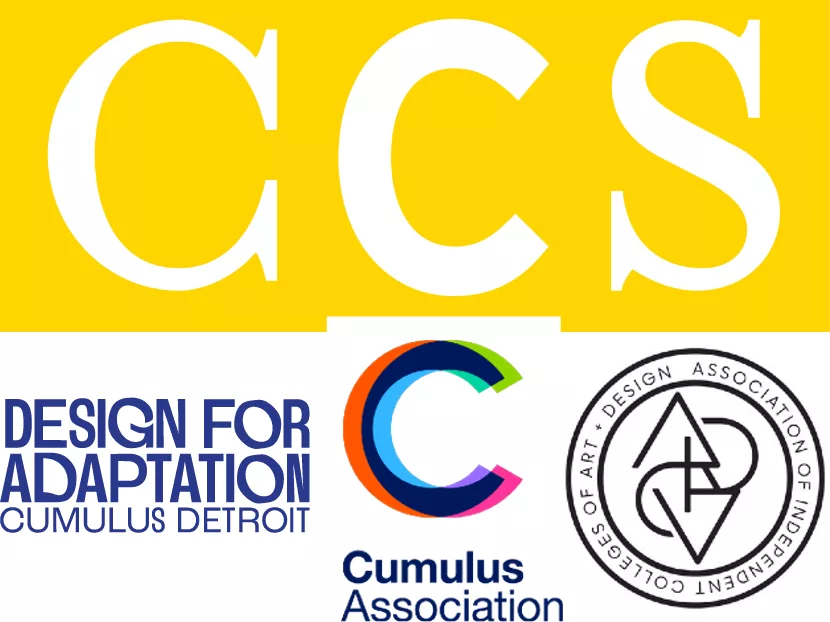The College for Creative Studies (CCS) is excited to host the international Cumulus Conference 2022 - Design for Adaptation in collaboration with the Association of Independent Colleges of Art and Design (AICAD), in Detroit, from Nov. 2-4, 2022. This is only the second time in its 30-year history that the Cumulus Conference will take place in North America, a testament to the expanding global reputation of both CCS and Detroit as leaders in changemaking.
This year's keynote speakers include Mikko Ollikainen, head of the Adaptation Fund, which finances projects and programs that help vulnerable communities in developing countries adapt to the effects of climate change. Ollikainen's talk will focus on the profound effects of climate change in these communities and share strategies for a more resilient and adaptive future. Neil Hawkins, president of Fred A. and Barbara M. Erb Family Foundation, will engage Ollikainen in a dialogue following his keynote.
"Climate Change is deeply intertwined with global patterns of inequity, and adaptation plays a key role in reducing exposure and vulnerability," said Maria Luisa Rossi, CCS Chair of Systems Design Thinking and Design for Adaptation conference chair. "It is time to involve systems thinking, and behavioral change in climate resilient development urgently and at scale. This conference will help guide our design approach and thinking on how to accelerate adaptation over the next decade."
Anika Goss, CEO of Detroit Future City, will focus on the local and hyper-local environmental impacts of climate change and the opportunities for Detroit to develop climate resilient neighborhoods. Goss is the Chief Executive Officer of Detroit Future City (DFC), a think-and-do tank focused on land use and sustainability, community and economic development, and economic equity in Detroit. Goss is a leading force and visionary in Detroit's revitalization, playing a crucial role as an advocate for an equitable and sustainable future for the city.
Design for Adaptation will offer many opportunities to explore the role artists and designers play in accelerating adaptation to the immediate and future impacts of climate change and extend beyond the environment to human rights, poverty, inequity, global food security, health, the economy, and land use.
Attendees will explore these topics through three tracks – Climate Ecosystem, Climate Citizens, Climate Apartheid – featuring 60 academic and professional papers and posters and multiple panel discussions. The conference offers the opportunity for peer-to-peer learning through Cumulus working groups on topics like service design, research, fashion, and textiles, placemaking and more that will take place during the conference. In addition, DESIS (Design for Social Innovation and Sustainability), led by Ezio Manzini, one of the world's leading thinkers in redefining the role of designers in contemporary society, will present a seminar entitled "Give Peace a Chance." In this seminar participants will use social innovation and design to explore concepts of peace in today's world.
Attendees will also have a chance to learn more about Detroit through site visits to Cranbrook, downtown Detroit, the Henry Ford, Michigan Central and Oakland Avenue Urban Farm.
"I am excited to welcome 300 delegates to CCS for this important conference," said Don L. Tuski, president of the College. "Climate action and social responsibility are an intrinsic part of the CCS curriculum, culture, and core. Detroit offers a rich variety of projects and initiatives that will help lead to a better future. I am excited for how CCS may play a bigger role in these initiatives in the future."
CCS has partnered with AICAD, of which it is a member, to further widen participation in this global conference to more North American institutions. AICAD has been exploring the intersections of climate change, racial justice and the arts and design for a few years through its annual symposia and other programs.
Design for Adaptation is supported by Fred A. and Barbara M. Erb Family Foundation, SBN Detroit and DTE Energy Foundation.
For information on the Design for Adaptation agenda and speakers, click here.
To register for Design for Adaptation, click here.




